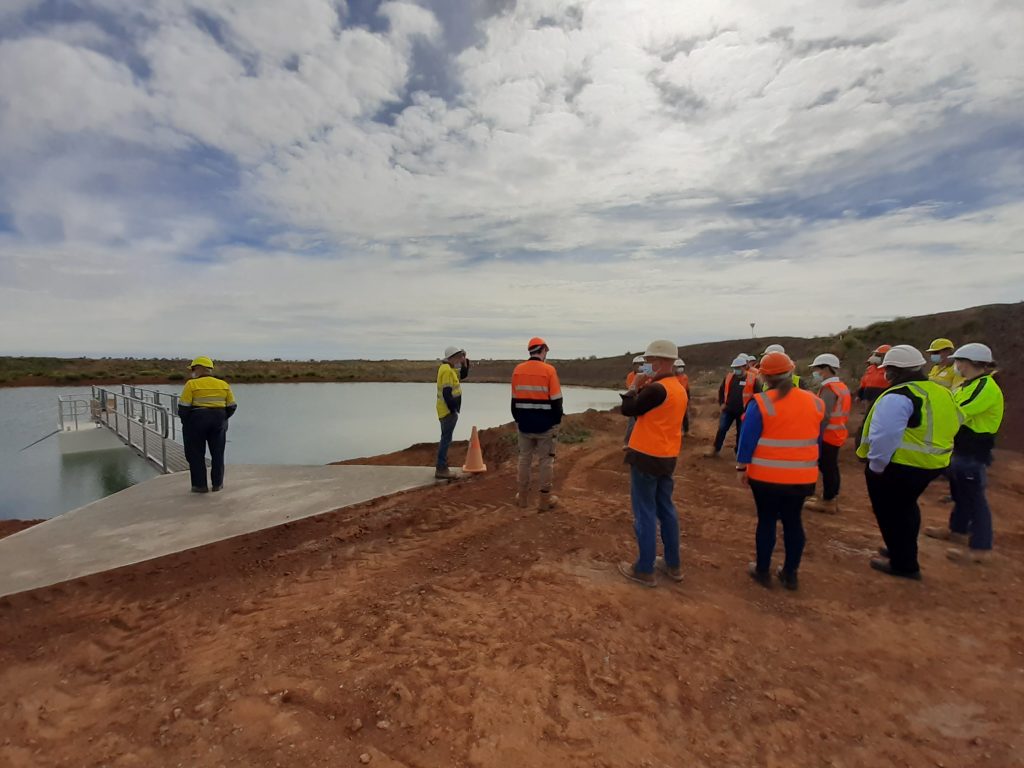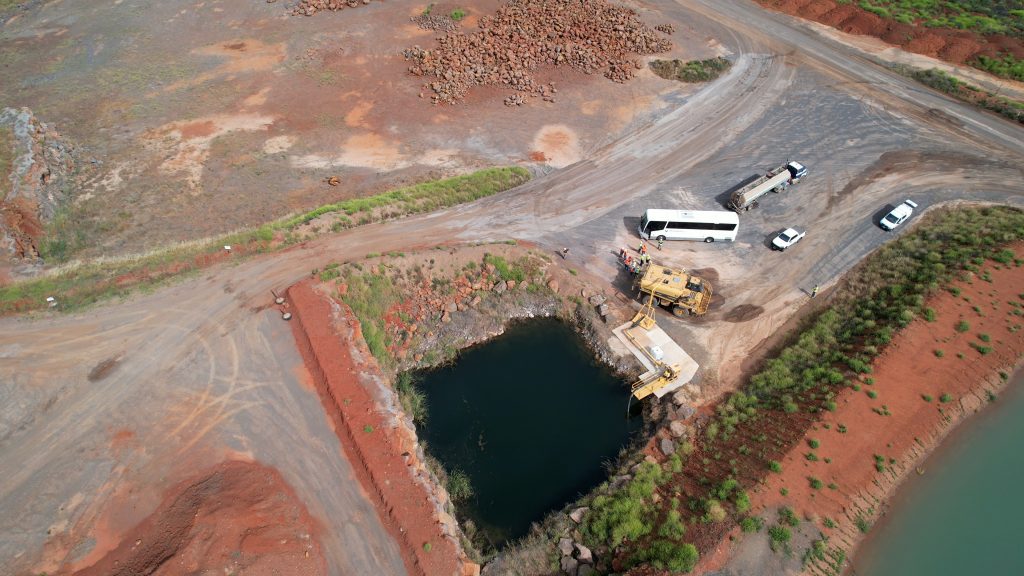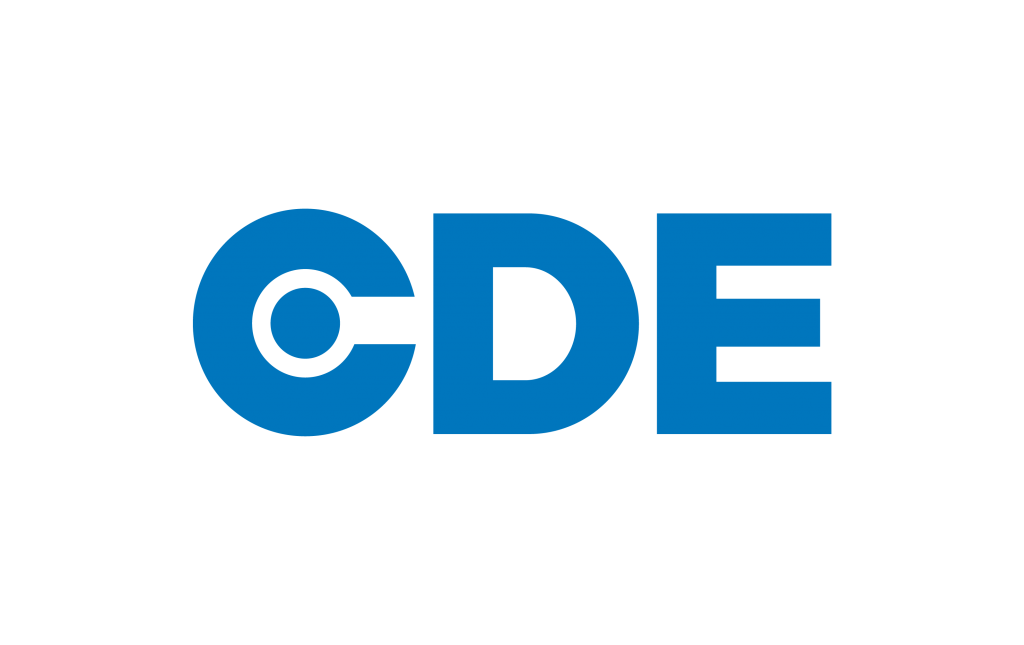Members Day 2021 – Water Management Workshop and General Meeting
GAVIN MOREIRA, Member Services Manager for CMPA provides an update on the Water Management Workshop and General Meeting held in Bendigo.
On 25th November 2021, the CMPA held a workshop to assist Members to manage water resources on quarry sites (sand, stone and gravel) in a safe and sustainable manner. To support members in meeting the requirements of the Victorian Water Act 1989, the Federal Water Act 2007, and the Victorian Environment Protection Act 2017.
The first activity for the morning was a site visit to Allstone Quarries by coach. On board was Quarry Foreman Brad Carr who gave us a run down on the site as we were driving around the quarry. Stops included the main face where drilling was currently taking place in set up for a future blast followed by the main dam with its new concreted pontoon as well as other areas relating to water management.
Once back at the hotel and following morning tea our first sponsor presentation was made by Riccardo Wong of CDE Global he played for us a video that highlights what they can offer in regards to Dewatering and Filtration systems.

Allstone Quarries, Brad Carr then returned and walked us through with large scale maps of the quarry; the construction and use of in pit water storage dams which would:
• Maximise the recovery and reuse of incident rainfall
• Reduce the extraction and use of groundwater
• Improve water availability for the plant and other uses.
The first presentation on returning to the venue was from the Workshop sponsor CDE Global (Riccardo Wong). Next up was the main presentation by Alexis Valenza from Valenza Engineering, which is a specialist groundwater engineering company providing integrated technical solutions in the fields of groundwater engineering and environmental hydrogeology.
Alexis is also author of the CMPA Water Management Guideline who spoke on understanding water management in the quarry environment. First off was a discussion on the complex legislative framework governing water as shown below:
Water Act 1989/2007 (Vic/MDB)
• Regulates construction of monitoring and abstraction bores, and storage dams
• Regulates water use and accounting
• Licensing functions delegated to relevant Rural Water Authority:
o Southern Rural Water, Goulburn Murray Water, Lower Murray Water & Grampians Wimmera Murray Water
Environment Protection Act 2017 (Vic)
• Regulates protection of human health and the environment from pollution/waste based upon General Environmental Duty (GED)
• Environmental Reference Standards (2021) have the force of law
• Emergency discharge permits
• Long term discharges, Works Approvals/Discharge licences
• Administered by Environment Protection Authority (EPA)
Other regulatory constraints (condition)
• Work Authorities (Earth Resources Regulation)
• Planning Permits (Local Council)
• Take & Use and/or Discharge Licence (Rural Water Authority/EPA)
Benefits of Effective Water Management
• Effective water management is critical to the viability of modern
operations as it is often a key factor in profitable quarrying.
• Effective water management helps stabilise high-walls, low-walls and stockpiles.
• Effective dewatering prevents temporary flooding of the operation and its assets.
• Optimising production costs (by reducing cost of haulage for drained material).
• Applying correct treatment to any water discharges to meet permit requirements will help avoid costs and delays caused by interventions from regulatory authorities.
Dry quarries (above water table)
PROS
No permanent dewatering infrastructure
No discharge (except emergency cases)
No impact on surroundings
Limited geotechnical stability issue
Consistent moisture content and Limited traffic issues
CONS
Water supply issues
Moisture in product
Dust management
Oversight of runoff management
Wet quarries (intersect the water table)
PROS
Water demand can be met
Washing and moisture content is not a constraint
Dust Management
CONS
Need a Hydrogeological Assessment
Take and Use and Need a Discharge Licences
Impact assessment on surroundings
Discharge and Inflow management
Monitoring and Geotechnical stability

Water Management Plan
• Complete Desktop Studies and Preliminary Site work
• Develop a preliminary Water Balance aligned with the quarry staging and tonnage
• Complete an Impact and Water Supply Assessment
• Assess the Licence and Regulatory Requirements associated with the site and the operation
• Work through the water cycle and assess potential discharge requirements
• Develop Triggers and Implement Management Actions
• Collect and analyse the Monitoring Data recorded, amend management measures if required
• Cover the Planning, Operational, Progressive Rehabilitation and Closure Phases
Key steps
• Conduct groundwater investigations together with the resource drilling
• Confirm site surface water and groundwater conditions
• Define a suitable monitoring network and regime and start the monitoring as soon as possible to acquire baseline monitoring data
• Conduct a preliminary water balance
• Obtain your water Licences (Take and Use and Discharge).
• Define the optimum dewatering / water extraction methodology, based on licence constraints.
• Be proactive in managing the lack or excess of water in order to save cost and avoid delays caused by interventions by authorities.
After lunch a sponsor’s presentation was given by FUCHS Lubricants (Australasia) (Louis Vardakis / Matt Allen) followed by Joshua O’Connor of Valenza Engineering on the CMPA Water Management Template. Next were presentations by the Regulators.
First off was Earth Resources Regulation, Tony Robinson on Water management, followed by Peter Robertson, Glenelg Hopkins Catchment Management Authority and finishing with Paul Ratajczyk from EPA.
The CMPA much appreciates the willingness of these different
Victorian Government entities to present at the Workshop enabling better understanding of CMPA Members’ responsibilities.
General Meeting
The General Meeting was opened by Jason Comben and commenced with a sponsor’s presentation by Tej Panesar from TSP Group of Companies. The next presentation was from Andrew Lumb, Nevitt Ford and Michael Hocking, CJ Ham and Murray on the complex subject of Land Tax.
Land Tax – Current situation
• It can be expected that more site Value determinations will lead to an increase in Land Tax Assessments relating to Extractive Industry operations particularly for those with multiple sites.
• It is understood a review of the current legislation may be under consideration.
• There does not appear to be any consistency of approach in determining the Site Value and Capital Improved Value relating to Extractive Industry sites in Victoria.
• Some operators are paying Land tax, some are not.
• Some assessments appear to be based on the Work Authority Area, approved extraction area or currently approved Stage of extraction.
• Industry consultation with State Government Authorities prior to the future drafting of legislation or valuation guidelines used for rating purposes.
The additional sponsor presentation was by Declan Halpin of Smart Tech Australia.

The final presenter of the evening was Kevin Simpson of EHS
– Support who conducted the CMPA Rehabilitation Review details of which may be found at page 15.
Note that the Water Management Workshop and General Meeting were both recorded and will be made available to CMPA Members at a later date.
Thanks again also to all the presenters and to our Water Management sponsors CDE Global and FUCHS Lubricants and General Meeting sponsors Smart Tech Australia and TSP Group of Companies.













You must be logged in to post a comment Login